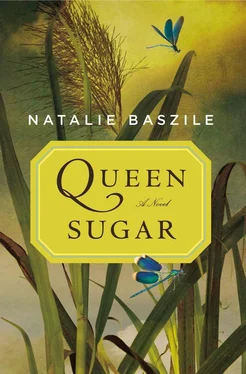“Good luck, Miss Bordelon. You’ll need it.” Landry was almost over the threshold when he turned back. “One more thing. You ever think of selling this place?”
“It hadn’t crossed my mind.”
“Well, if it does, give me a call.”
“And why would I want to sell?”
“Who knows?” Landry pointed to the card she held. “I’m just throwing it out there. You seem like a sensible young woman. It’d be a shame to see you get in over your head.”
• • •
NeNee Desonier’s trailer could have been the subject of a Dorothea Lange photograph, with its yellowing newsprint and strips of faded floral wallpaper clinging to the walls. In the places where there was neither newsprint nor wallpaper, gigantic watermarks, like seismographic readouts, stained bare plaster, which, over the years, Charley guessed, had turned from chalky white to burnt sienna. And NeNee herself should have been captured in a gelatin print. Her small dark face, etched with wrinkles, had a sinkhole in the middle where her top four teeth were missing. She was no taller than Micah, Charley thought, and probably ten pounds lighter. A bright green stocking cap swaddled her small head, and her faded housedress was so threadbare, it was a wonder it didn’t disintegrate as she stood there.
But Charley was on a mission. The more she thought about Landry’s intrusive questions, the way he seemed to prophesy her failure, the angrier she got. So when she found NeNee Desonier’s name and address on an old pay stub in the files, she acted without thinking; got in her car and drove all the way out to Four Corners, the sleepy hamlet on the outskirts of the parish.
Now here she was, in NeNee’s living room. “As I was saying.” Charley smiled. NeNee did not. “I found your name on this piece of paper.” She held out the pay stub.
NeNee glanced at it and nodded politely.
“How long did you work for Mr. LeJeune?”
NeNee held up four fingers, which meant either “four years ago ” or “ for four years,” Charley couldn’t tell.
“What kind of work did you do?” Charley asked.
NeNee offered another polite smile, but she looked increasingly nervous. Every few minutes she stole a glance at the front door.
Charley knew she should go. But she had driven all this way, was holding tight, like a child on a carousel, to the fantasy that NeNee Desonier was a seasoned manager like Denton, or a young, ambitious field hand on the lookout for an opportunity to run the show. At this point, she would have hired a middle schooler if he or she had worked cane before.
“Ma petite-fille,” NeNee said.
“What’s that?”
NeNee pointed to the yard. The next second, a woman in her mid-forties, dressed in pink medical scrubs and sneakers, pushed through the front door. She saw Charley and stopped short. “Who are you?”
Charley introduced herself, offered her hand, but the woman regarded it suspiciously, then turned to NeNee and said something in what sounded like French, but wasn’t quite. And suddenly, NeNee came to life. She chattered on, gesturing and occasionally pointing to Charley. The younger woman nodded, frowned, then glared at Charley over her shoulder. Finally, she turned.
“What do you want with my grandmother?”
“I thought—”
“Thought what?”
“I just thought, maybe she’d like to work for me.” Charley started to explain about her farm, thought of explaining about Denton’s refusal, but said only, “I own some acreage off the Old Spanish Trail—” when the woman cut her off.
“My grandmother is seventy-seven years old.”
NeNee hobbled over to the rocker and sat down. She looked from Charley to her granddaughter, who, Charley realized, still hadn’t said her name.
“I can see your grandmother is quite frail,” Charley said. “I didn’t realize until I got here. I was in the office, I mean, the shop, sorting through stacks of papers and I found this.” She held out the pay stub.
The woman glanced at the stub, then appraised Charley with a steely gaze. “You ain’t from around here.”
“I’m from California.”
“California,” the woman said, as though California were a hostile nation.
“But I live here now, with my grandmother. Not too far, as a matter of fact.”
“Excuse me, but have you ever worked cane?”
“No.” Charley sighed. “I haven’t.”
The woman drew herself up. “Well, I have. And let me tell you, cane work is the hardest, dirtiest, most backbreakin’, thankless, low-paying work there is. My family’s worked cane for six generations, and after all that, we ain’t got nothin’ to show for it. Just look at my grandmama’s house.” She made a sweeping gesture. “She worked cane since she was nine years old, and this is all she’s got. Has she got any money saved? Has she got a pension? Health care? Does she own anything but this trailer and the little speck of sorry-ass ground it sits on?” Drops of sweat spangled her hairline. “Those big cane farmers cut corners with her every chance they got.”
Charley wanted to say that she was different, that she would offer medical benefits, a retirement plan, even a small life insurance policy. She wanted to look straight at the woman and ask, How about you — can I hire you ? But she had the overwhelming sense that she’d be digging a hole for herself.
“If it wasn’t for social security,” the woman fumed, “and the little bit us grandkids scrape together each month, my grandmother would be out on the road.” The more she spoke, the thicker her accent grew. “And here you come, pecking around like a spring chicken. Talking like someone on the TV. Asking if she’ll work for you?”
“I should go.”
“I bet you’d be even worse to work for than a white man.”
Charley grabbed her backpack and stuffed the pay stub in the front pocket, let herself out, and hurried down the steps. At the bottom, she paused. All she wanted was to find workers and get down to business. Jacques Landry was one thing — she should have expected that. But her own people? Who did they think she was? She looked back at the woman barring the doorway. “Sorry if I offended you or your grandmother.”
“I bet.” And with that, the woman slammed the door.
Four hundred miles to go. They were almost home. East of San Antonio, Ralph Angel saw a sign for Corpus Christi and got an idea. He merged off the interstate onto Highway 37. In the passenger seat, Blue continued his low, rumbling dialogue with Zach the Power Ranger, who was still imprisoned in the glove box. “’Cause we might get arrested,” Ralph Angel heard him say. “So you have to stay inside and be very, very quiet.”
Blue looked up and asked, “Are we there yet?”
“What did I say about that? Just wait. I have a surprise.”
Eventually, the woods yielded to marshland, the two-lane road cutting a straight line through an expanse of gray water peppered with reeds and tufts of low, wiry grass. Egrets, white as porcelain, took flight from their rookeries, while in the distance a house balanced on stilts, lording over its watery homestead, and seeing all this, Ralph Angel felt something within him begin to shift. Like a page being turned.
Farther south, the road ended abruptly at the Intracoastal Waterway, the narrow channel stretching from the mouth of the Mississippi to the Rio Grande. A short wood dock jutted out into the water. Ralph Angel could see where the road picked up on the other side — not even sixty feet; they could almost swim across.
“What now?” Blue said.
“We wait.”
It wasn’t long before a ferry cruised up the channel. Cracked black buoys dangled from its rusted bow, paint curled away from the wheelhouse, but otherwise, nothing had changed; it was the same ferry as when he was a kid, and Ralph Angel, suddenly breathless with an old excitement, thought back to the day his daddy brought him to this very spot. A summer trip to the beach, just the two of them; a vacation he waited months to take, his father having called from California that September to say they would go someplace special when school got out. Ralph Angel had marked the days off the calendar, slogged through the long months until June finally arrived and his father, dashing in slacks and loafers, knocked on the front door. And while his father steered the Buick LeSabre with one hand, the other arm propped in the open window, he sang along to the cassette tape — Al Green’s version of “People Get Ready”—as they cruised over the blacktop road. Ralph Angel bathed in the radiance of his dad’s presence, so happy he thought he would burst.
Читать дальше












